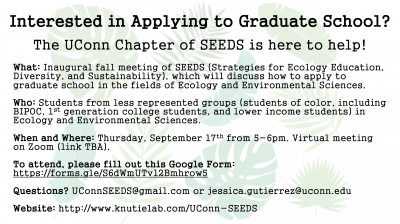Date: Wed, 23 Sep 2020 17:49:34
From: privateemail343213@community.esa.org
Subject: Lab and Collections Manager Position: Conservation Genomics, Colorado State University
Lab and Collections Manager Position: Conservation Genomics, Colorado State University
The Ruegg Lab at Colorado State University is seeking a highly organized, enthusiastic, and motivated scientist to fill a Conservation Genomics Lab and Collections Manager position. The successful candidate will work closely with our multi-disciplinary team of technical staff, graduate students, senior researchers, post-docs and faculty within the Biology Department at Colorado State as well as part of the multi-institutional Bird Genoscape Project. For more information on our research please see the Bird Genoscape Project website (https://na01.safelinks.protection.outlook.com/?url=https%3A%2F%2Fbirdgenoscape.org%2F&data=02%7C01%7Cpat.anderson%40uconn.edu%7C7499da60e9b44159ec7908d8606a5609%7C17f1a87e2a254eaab9df9d439034b080%7C0%7C0%7C637365357260412526&sdata=1NAS63nHimqBjKQXaU4aGeFuwWcJA88tG7X9y4nPtPA%3D&reserved=0) as well as the Ruegg lab website (https://na01.safelinks.protection.outlook.com/?url=https%3A%2F%2Fsites.google.com%2Frams.colostate.edu%2Fruegglab%2Fhome&data=02%7C01%7Cpat.anderson%40uconn.edu%7C7499da60e9b44159ec7908d8606a5609%7C17f1a87e2a254eaab9df9d439034b080%7C0%7C0%7C637365357260412526&sdata=ydSLdRyzJq4PcgZpD0tV%2BreW0CLIYrn%2Fd0PcR976ZfM%3D&reserved=0). You can also view this job posting as a PDF here: https://na01.safelinks.protection.outlook.com/?url=https%3A%2F%2Fdrive.google.com%2Ffile%2Fd%2F1tYBZmLeHe7j1NJfJ5YggrYt3aJ9tyi37%2Fview&data=02%7C01%7Cpat.anderson%40uconn.edu%7C7499da60e9b44159ec7908d8606a5609%7C17f1a87e2a254eaab9df9d439034b080%7C0%7C0%7C637365357260412526&sdata=qJXJ2%2B4ia6leZVVhdkw19VMjtgm34Hk9c%2FXu79idJ14%3D&reserved=0.
Duties will include, but are not limited to:
Ãf¢ÒÂEURÒ¢ Preparing whole genome sequencing libraries.
Ãf¢ÒÂEURÒ¢ Genotyping SNPs using Fluidigm equipment and assays.
Ãf¢ÒÂEURÒ¢ DNA extractions from feathers, blood, and tissue, as well as museum samples.
Ãf¢ÒÂEURÒ¢ Managing and training undergraduate volunteer and work study students.
Ãf¢ÒÂEURÒ¢ Ordering supplies and equipment maintenance.
Ãf¢ÒÂEURÒ¢ Curating a 200,000+ blood, feather, and tissue sample collection.
Ãf¢ÒÂEURÒ¢ Renewing permits and submitting annual reports to appropriate agencies.
Ãf¢ÒÂEURÒ¢ Maintaining collaborator relations, shipping sampling supplies, and receiving samples.
Ãf¢ÒÂEURÒ¢ Maintaining compliance with environmental and safety procedures.
Ãf¢ÒÂEURÒ¢ Organizing lab events and maintaining lab website and social media pages
Ãf¢ÒÂEURÒ¢ Managing written protocols, Standard Operating Procedures, etc. for lab and field work.
Minimum Qualifications Include:
Ãf¢ÒÂEURÒ¢ Bachelors or MasterÃf¢ÒÂEURÃ’Â(tm)s degree in biology, genetics or a related field is preferred.
Ãf¢ÒÂEURÒ¢ Extremely strong organization skills and the ability to work as part of a team as
well as accomplish tasks independently.
Ãf¢ÒÂEURÒ¢ Excellent communications skills and a willingness to follow instructions and
direct others when needed.
Ãf¢ÒÂEURÒ¢ Extreme attention to detail.
Ãf¢ÒÂEURÒ¢ Excellent and thorough laboratory notebook maintenance abilities.
Ãf¢ÒÂEURÒ¢ Experience with basic and intermediate laboratory methods, including pipetting,
PCR, gel electrophoresis, and DNA extraction.
Ãf¢ÒÂEURÒ¢ Strong desire to learn new genomic sequencing methodologies.
Also desired:
Ãf¢ÒÂEURÒ¢ Experience with whole genome and transcriptome library preparation.
Ãf¢ÒÂEURÒ¢ Experience with database management.
Start date and duration: Preferred start date is on or before Jan. 15, but is open to negotiation; Initially, the appointment will be for a period of 12 months, with the possibility of extending it to 2 years or more dependent upon performance and the availability of research funds.
Applications: Interested applications should contact Teia Schweizer (Teia.Schweizer@colostate.edu) before Oct. 15. Please include a cover letter, CV, and contact information for 3 references in a single document. In the cover letter please highlight your previous laboratory experience and interest in conservation genomics. This will be a full- time position, with benefits and an annual salary commensurate with experience.
